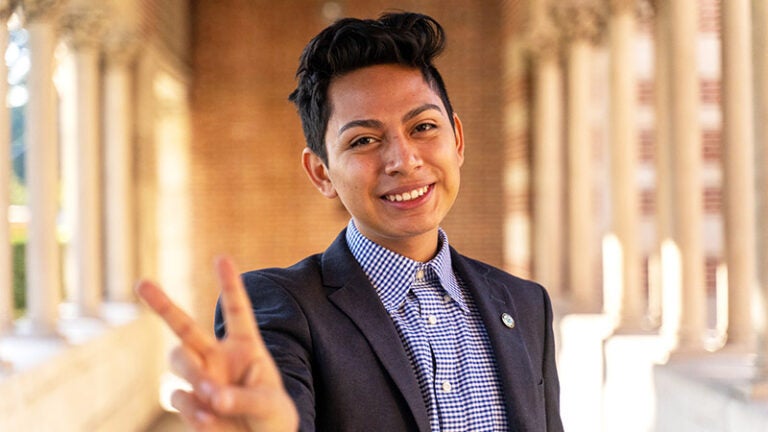
First-gen student aims to pursue a business career that enables him to give back to the community he grew up in
The big picture:
- Luis Tun wants to help first-generation, Latinx and low-income families build generational wealth and manage their finances.
- USC scholarship and financial aid resources helped Tun afford school and even helped him land an internship with Goldman Sachs.
Luis Tun’s family emigrated from Muna, Yucatàn, Mexico, to Newbury Park in California’s Ventura County when he was 6 years old. Waiting for them there was a community of people from his hometown ready to help smooth the transition.
Now, as a senior studying political science with a minor in Spanish at the USC Dornsife College of Letters, Arts and Sciences, Tun is looking to join the business world and eventually found a company dedicated to providing financial advice for immigrant and low-income communities like the one he and his family found so welcoming.
“I want to teach about personal finance to build that generational wealth for Latinx, first-generation immigrant and low-income families, so they know about investing, savings, college education and other things,” he says. “I hope to start a business in that realm of social entrepreneurship.”
In addition to his undergraduate coursework at USC Dornsife, Tun is also, through the progressive degree program, pursuing a joint master’s degree in communication data science from the USC Viterbi School of Engineering and the USC Annenberg School for Communication and Journalism. He aims to draw upon his divergent paths of study to bring a more holistic approach to a business career.
“I hope to combine the humanities aspects of my education into a business setting because I feel a lot of the time within business, it’s really focused on revenue, profit, and there’s a lack of those aspects about people, making our businesses more equitable and changing the culture within the company to match the needs of society,” he says.
Exploring his options
Tun decided to attend USC after reading a Los Angeles Times profile about Edwin Saucedo, former USC student body president.
“The article was talking about a first-gen Latino student from a low-income immigrant background. Reading that, I realized I wanted to go to a school that had that sort of representation,” he says.
Tun notes that financial aid was also a consideration in his college selection process, and he was happy to have received a USC Latino Alumni Association (LAA) Scholarship, the Norman Topping Student Aid Fund scholarship and other financial aid, which when combined covered his tuition in full. And with the support of both the USC Dornsife Fisher Fellowship and the LAA’s Felipe Plascencia Exceptional Funding Endowed Scholarship, which provided Tun with some funding for housing and a professional wardrobe, he landed internships at several places, including Goldman Sachs.
“Being able to have this scholarship gives me the opportunity to invest my time in building my resume and working at an internship rather than having to hold down a part-time job in addition to my studies,” he says. “I also got a mentor through LAA who helped me build my resume, prep for interviews and prepare for my internship application processes.”
As far as advice to new students goes, Tun recommends keeping an open mind about one’s life and career goals.
“I think I came in here really headstrong about becoming student body president, only going to a top law school and working in immigration law, but through my experiences and opportunities and exposure to alumni and mentors, I was able to figure out more of what my interests are and what I want to do,” he says. “You never know where things might end up, so really explore what’s out there.”